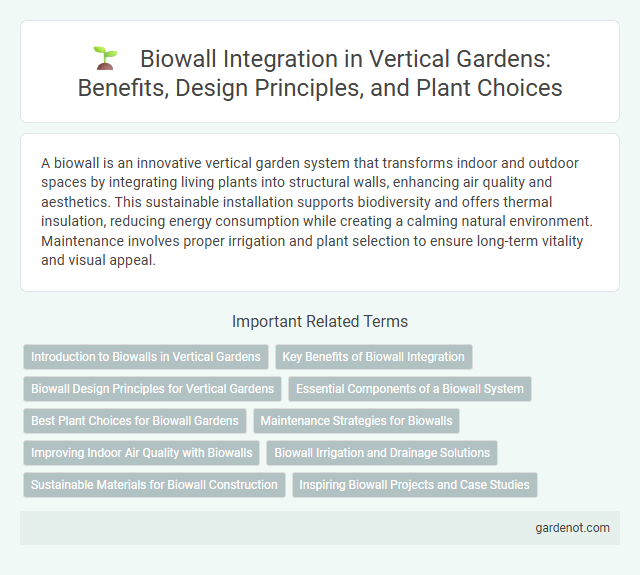A biowall is an innovative vertical garden system that transforms indoor and outdoor spaces by integrating living plants into structural walls, enhancing air quality and aesthetics. This sustainable installation supports biodiversity and offers thermal insulation, reducing energy consumption while creating a calming natural environment. Maintenance involves proper irrigation and plant selection to ensure long-term vitality and visual appeal.
Introduction to Biowalls in Vertical Gardens
Biowalls in vertical gardens integrate living plants into structural panels, creating eco-friendly, space-efficient greenery that enhances air quality and aesthetics. These vertical ecosystems use advanced irrigation and substrate systems to support diverse plant species while promoting biodiversity in urban environments. Designed for both indoor and outdoor settings, biowalls contribute to energy savings by improving insulation and reducing ambient temperatures.
Key Benefits of Biowall Integration
Biowall integration enhances indoor air quality by naturally filtering pollutants and increasing oxygen levels, creating a healthier living environment. It contributes to energy efficiency through improved insulation, reducing heating and cooling costs significantly. The vertical garden also promotes biodiversity, supports mental well-being by providing a natural aesthetic, and increases property value.
Biowall Design Principles for Vertical Gardens
Biowall design principles for vertical gardens emphasize optimal plant selection, structural support, and efficient irrigation systems to ensure healthy growth and longevity. Incorporating modular panels allows for scalability and easy maintenance while promoting air purification and aesthetic enhancement. Strategic placement of plants based on light exposure and water needs maximizes biodiversity and system sustainability.
Essential Components of a Biowall System
A Biowall system consists of essential components including a structural framework that supports plant panels, an integrated irrigation system for precise water delivery, and a nutrient distribution mechanism to ensure optimal plant growth. Advanced lighting solutions mimic natural sunlight, enhancing photosynthesis for indoor or shaded environments. The filtration system within a Biowall controls air quality by trapping pollutants, making it an effective living wall that improves indoor ecosystems.
Best Plant Choices for Biowall Gardens
Best plant choices for Biowall gardens include species like Philodendron, Pothos, and Spider plants, known for their adaptability and air-purifying qualities. Ferns and succulents are also popular due to their low maintenance and drought resistance, making them ideal for vertical garden installations. Selecting a mix of shade-loving and sun-tolerant plants ensures a vibrant and sustainable Biowall ecosystem.
Maintenance Strategies for Biowalls
Effective maintenance strategies for Biowalls include regular irrigation management, nutrient supplementation, and routine inspection for pests and diseases to ensure the health of vertical plants. Automated irrigation systems with sensors optimize water use, reducing waste while maintaining ideal moisture levels. Periodic pruning and replacement of damaged plants help sustain the aesthetic appeal and functional benefits of Biowall installations.
Improving Indoor Air Quality with Biowalls
Biowalls, also known as vertical gardens, significantly enhance indoor air quality by naturally filtering airborne pollutants and increasing oxygen levels through their dense plant coverage. These living walls utilize a variety of plant species that absorb volatile organic compounds (VOCs) and particulate matter, helping reduce indoor toxins and improve overall air freshness. Integrating biowalls in indoor environments promotes healthier air circulation and supports better respiratory health for occupants.
Biowall Irrigation and Drainage Solutions
Biowall irrigation and drainage solutions integrate advanced water distribution systems to ensure optimal moisture levels for vertical garden plants. These systems utilize tailored drip irrigation combined with efficient drainage channels to prevent waterlogging and promote healthy root development. The precise water management maximizes plant growth while conserving water resources, enhancing the sustainability of Biowall installations.
Sustainable Materials for Biowall Construction
Biowall construction utilizes sustainable materials such as recycled aluminum frames, biodegradable plant substrates, and non-toxic waterproof membranes to ensure eco-friendly vertical gardens. These materials reduce carbon footprint, enhance durability, and support healthy plant growth by providing optimal aeration and moisture retention. Incorporating renewable resources and recyclable components in Biowall design promotes environmental responsibility and long-term sustainability in urban greening projects.
Inspiring Biowall Projects and Case Studies
Biowall vertical gardens showcase innovative solutions in urban green spaces, transforming indoor and outdoor environments with sustainable designs. Renowned projects like the Singapore Changi Airport Biowall demonstrate how these living walls improve air quality, enhance aesthetic appeal, and promote biodiversity. Case studies highlight the adaptability of Biowall systems in commercial, residential, and public settings, emphasizing energy efficiency and wellness benefits.
Biowall Infographic

 gardenot.com
gardenot.com